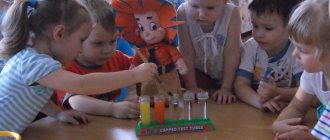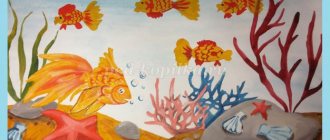Conditions necessary for organizing basic search activities with children.
- The first condition is related to the spatial organization of experiments. The child must see the object himself and everything that happens to it, hear the sounds emanating from it, and be able to smell it. In cases where an object of nature can be touched or picked up, the child should have the opportunity for tactile-kinesthetic examination in order to feel the nature of the surface, shape, temperature and heaviness of the object. The pedagogical requirement for the spatial organization of experience is that any natural object should be as accessible as possible for every child to perceive. Handouts are a good help in organizing the experience. The teacher must also remember that the word follows sensory knowledge - only in this case does the child develop full-fledged knowledge.
- The second condition is related to the time parameter: viewing and perception of any objects and natural phenomena should be short-lived. This requirement is determined by the fact that observation is a mental intellectual activity that requires concentrated attention and mental effort. This activity is difficult for preschoolers. Therefore, the duration of observation should be approximately 3-10 minutes - this is the optimal time for intensive mental activity of children, for concentrating attention and independently obtaining and assimilating a small amount of information. Children should begin and complete the experience in a positive emotional state, without mental fatigue - this is the success and educational effectiveness of this event.
- The third condition is related to the structure of experience. Each of them has a beginning, a main part and an end. Their functions are different. Their correct understanding and implementation will help the teacher achieve an overall positive pedagogical effect.
- Fourth condition. This is a teacher’s diagnosis of the level of knowledge in children about the phenomena of living and inanimate nature. As well as the level of development of logical thinking. This is necessary in order to select the most accessible knowledge that is not complex for a given level, as well as the correct methodology for conducting the experiment (additional questions, longer examination, etc.).
Thus, compliance with these conditions makes it possible to carry out cognitive and research activities with children in a pedagogically appropriate way and with the greatest effect for the education of children.


